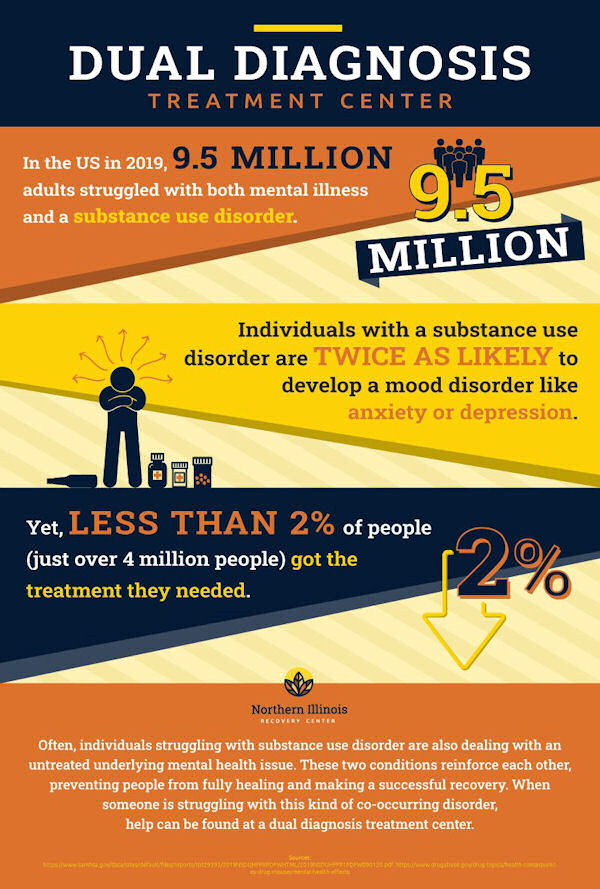If you or someone you know is battling a substance abuse problem, finding out how to take the first steps toward recovery and sobriety can be very difficult. Trying to quit using drugs or alcohol while dealing with a co-occurring mental health disorder is especially challenging. This leads to the need for a dual diagnosis treatment program.
Mental health disorders and addiction commonly occur together, making treatment slightly more complicated. Fortunately, with the help of a dual diagnosis treatment program, both conditions can improve. This can help to increase the likelihood of long-term recovery.
Our dual diagnosis treatment center is located 45 miles from Chicago and provides a full continuum of care in the Midwest. Northern Illinois Recovery Center in Crystal Lake, Illinois, offers dual diagnosis treatment for people with addiction and co-occurring mental illness. Learn that we can support you and your loved ones throughout the recovery process.
The effectiveness of dual diagnosis treatment is enhanced when both the mental health condition and the substance use disorder are addressed simultaneously. Various levels of care are available, tailored to the unique combination of disorders present in each individual, with a primary focus on alleviating psychiatric symptoms and minimizing substance use. For example, several cognitive behavioral therapies have been specifically developed to treat both post-traumatic stress disorder and addiction at the same time. Treatment options for individuals with dual diagnoses may include:
- Motivational enhancement
- Cognitive-behavioral therapy
- 12-Step meetings
- Contingency management
- Dialectical behavioral therapy
- Group therapy
- Peer-led supportive services
- Pharmacotherapy (medications used to treat mental health disorders like depression)
Most important in patients with dual diagnosis is that patients are given individualized treatment plans that address both the mental health disorder and substance use disorder. Many people don’t understand what a dual diagnosis is or why it is necessary to treat both conditions. But the truth of the matter is that if a person has co-occurring disorders, specialized treatment is a necessity.
How Common Are Co-Occurring Disorders?
As reported by SAMHSA in 2023, approximately 21.5 million adults, representing 8.4% of the population in the United States, were identified as having co-occurring disorders, which encompass any mental illness alongside at least one substance use disorder. The incidence of these disorders was most pronounced among young adults aged 18 to 25. Mental health disorders most frequently associated with substance use disorders include:
- Depression
- Anxiety disorders
- Grief
- Borderline personality disorder (BPD)
- Post-traumatic stress disorder (PTSD)
- Attention-deficit hyperactivity disorder (ADHD)
- Gambling Addiction
- Eating disorders
- Schizophrenia
- Bipolar disorder
During active addiction, it is common to neglect one’s medical physical, and even mental health treatment needs. Even if you are taking medication for a mental illness as prescribed, drugs and alcohol can lessen their effectiveness and worsen your withdrawal symptoms. A dual diagnosis program specializes in diagnosing and treating both substance abuse and mental health issues. They can help you manage both conditions during and after treatment.

Symptoms of Mental Disorders and Substance Use Disorders
- Sudden behavior changes
- Difficulty managing daily tasks
- Retreating from relationships with family and friends
- Poor attendance or performance at work or school
- Changes in personality or mood
- Neglecting health and hygiene
- Engaging in risky behaviors
- Developing high tolerance to a substance
- Feeling the need to use the substance to function normally
- Losing control over substance use
- Using substances under unsafe conditions
- Experiencing withdrawal symptoms
If you have received a diagnosis of both a mental health condition and a substance use disorder, dual diagnosis treatment is appropriate for your needs.
Causes of Co-Occurring Disorders
- Poor self-image
- Long-term substance abuse
- Growing up in impoverished conditions
- Genetic history of mental health disorders and substance abuse
- Exposure to drugs, alcohol, or other toxic materials in the womb
- Gender (Men are statistically more likely to suffer from co-occurring conditions than women)

For optimal results, individuals with a dual diagnosis should undergo integrated treatment for both types of disorders at the same time. Programs specifically address each disorder while also taking into account how they may interact and influence one another. For instance, a dual diagnosis treatment program may focus on managing withdrawal symptoms and addressing addiction, while concurrently providing therapeutic support for the associated mental health disorder.
Decades of research strongly suggest a genetic component to the development of addiction and mental health challenges. Having a family history that includes depression or addiction increases the chances that you will also suffer from these disorders.
Some studies state that individual genes and gene networks appear to function differently in individuals who suffer from addiction than in those who do not. Also, prenatal exposure to drugs, alcohol, or other toxins can contribute to co-occurring disorders later in life.
A family history of substance abuse and addiction can also be an environmental influence. Children who grow up in houses where people freely use alcohol or other drugs may believe this behavior is acceptable. Mental illness has several influences, including exposure to certain drugs or chemicals. Traumatic experiences (including combat) can cause stress on the brain, resulting in mental health conditions such as anxiety disorders.
Growing up in difficult financial situations also makes it more likely for a person to suffer from co-occurring disorders. There may even be a close relationship between poverty, chronic stress, mental illness, and addiction in many cases.
Which Co-Occurring Disorder Develops First?
Addiction can also lead to a mental health condition, especially if addiction remains undiagnosed or untreated. Long-term drug or alcohol use and drug abuse can cause mental health disorders. For example, extended alcohol abuse can cause anxiety and depression. To alleviate the symptoms related to depression and anxiety, someone will continue to misuse drugs and alcohol. This cycle of substance use only exacerbates symptoms making mental health and substance abuse treatment centers more necessary.


Benefits of a Dual Diagnosis Treatment Program
Treatment programs for substance abuse and mental health disorders offer you the ability to seek treatment for mental health conditions and addiction at the same time. Often this leads to better recovery journey outcomes. Untreated or undiagnosed mental disorders can complicate addiction treatment. They also play a role in causing addiction. This makes a dual diagnosis treatment program an ideal choice for those who deal with mental health problems and addiction, as it can also prevent relapse.
A dual diagnosis often presents a complex situation, necessitating a more rigorous treatment regimen than that required for a mental health disorder in isolation. The advantages of dual diagnosis treatment include the ability for the individual to:
- Receive the necessary treatment to stop using drugs or alcohol
- Receive therapy to help them cope with their mental health disorder
- Work with a therapist to understand how their co-occurring disorders are connected
- Address the roots of addiction and the causes of their mental health disorder
- Learn coping mechanisms for mental health conditions
- Identify and avoid triggers associated with relapse
- Build a solid relapse prevention plan
- Increase their motivation for engaging in treatment
An essential benefit of a dual diagnosis treatment program is that you can get immediate access to a psychiatrist instead of having to wait for an outpatient appointment. Our treatment team is also well-versed in recognizing and treating mental health signs and symptoms that typically worsen during detox. Your treatment plan may also involve the following services:
- Medication-assisted treatment
- Medication management
- Evaluation and diagnosis of mental health disorders
- Assertive community therapy that helps you connect to community-based supports
- Access to a psychiatrist
- Sober living
- Aftercare program
Our dual diagnosis evidence-based treatment program in Crystal Lake, IL, offers access to medical and mental health professionals. These experts can help you manage your mental disorder while addressing your alcohol and drug abuse issues.
Dual Diagnosis Treatment
Residential Treatment is a comprehensive care program that generally lasts between 28 and 90 days. Throughout this period, you will live at our facility and benefit from ongoing behavioral therapy and healthcare provided by our experienced staff. Alongside individual therapy, group therapy, and a range of counseling sessions, you will also have the chance to participate in holistic treatment alternatives.
Once people have completed our other treatment services, we recommend they attend an outpatient program to receive continued support. Unlike residential treatment, an outpatient facility allows patients to receive the benefits of treatment once or twice a week to ensure that they have the tools they need to stay sober without intensive treatment.
Sometimes, a person doesn’t have the time or resources necessary to attend a residential treatment center. Fortunately, a partial hospitalization program offers the next best thing for individuals requiring outpatient treatment. Also known as day treatment programs, people attend a PHP during the day and return home at night, as outpatient treatment does not require someone to live at the rehab facility, unlike those in residential inpatient treatment programs.
As patients move through our treatment programs, they often find that they don’t need the extensive treatment that our PHP offers. Fortunately, an intensive outpatient program allows patients to attend treatment a few days a week. During the rest of the time, the patient can return home to put the strategies they learned in intensive outpatient treatment into practice in the real world.
To avoid relapse of either condition, it’s essential to seek a treatment program for co-occurring substance use disorders and mental health disorders, such as the one we offer at NIRC. Common therapy and combined treatment options offered at our dual diagnosis treatment center include:
- Cognitive behavioral therapy (CBT)
- Dialectical behavior therapy (DBT)
- Individual therapy
- Group therapy
- Family therapy
Individual therapy sessions take place in a one-on-one setting. Group therapy is unlike individual therapy in that the sessions take place in a group setting. Family therapy sessions involve the recovering individual and their family members. While these and other evidence-based therapies differ in method and setting, they can all be beneficial in addressing dual diagnoses.

Many people with co-occurring conditions believe that they can only get treatment for one issue or the other. However, if someone only seeks treatment for one condition, they increase the likelihood of relapse. If they only seek treatment for the mental health condition, their continued substance use may lead to other mental illnesses. Alternatively, the symptoms of their original disease may get worse.
That said, if they only seek treatment for substance abuse, they do not have the tools to manage their mental health symptoms. Without these tools, they may return to using drugs or alcohol. Returning to drug use or alcohol use is incredibly risky because if they start using substances at the rates they formerly used, they risk an overdose. To learn whether our treatment options will work for you, please reach out to our Illinois rehab facility today.

Dual Diagnosis FAQs
Dual diagnosis treatment often addresses a mental health condition alongside a substance abuse disorder. This is because an individual may abuse substances as a coping mechanism for their mental health or, inversely, develop a condition due to the effect their addiction has on their brain. Mental health disorders most frequently associated with substance use disorders include:
- Depression
- Anxiety disorders
- Grief
- Borderline personality disorder (BPD)
- Post-traumatic stress disorder (PTSD)
- Attention-deficit hyperactivity disorder (ADHD)
- Gambling Addiction
- Eating disorders
- Schizophrenia
- Bipolar disorder
Which condition came first depends largely on the person suffering from co-occurring mental health and substance use disorders. In some cases, a person may have started using drugs or alcohol to manage their mental illness. For instance, some people use these substances to help them manage their depression. They feel like they have to use drugs or alcohol to feel normal. Alternatively, some substances can cause mental illness. For example, long-term cocaine use can lead to anxiety disorders.
Mental health disorders can include anxiety disorders, depression, mood disorders, personality disorders, and trauma. The National Survey on Drug Use and Health indicates that co-occurring disorders are prevalent.
As reported by SAMHSA in 2023, approximately 21.5 million adults, representing 8.4% of the population in the United States, were identified as having co-occurring disorders, which encompass any mental illness alongside at least one substance use disorder. The incidence of these disorders was most pronounced among young adults aged 18 to 25. A dual diagnosis program specializes in diagnosing and treating both substance abuse and mental health issues. They can help you manage both conditions during and after treatment.
If you are concerned that a loved one needs dual diagnosis care, early intervention can help lessen the consequences of their condition. Watch for the aforementioned signs and symptoms of co-occurring disorders and consult a medical professional with your observations. You can also ask them openly about their mental health and provide a safe space for them to share.
Dual diagnosis combines mental health and addiction recovery care to address your condition as a whole. Your care will start with a comprehensive assessment of your mental health, medical history, and current symptoms to determine a personalized care plan. Other factors, such as lifestyle, condition severity, and preference, also affect your treatment plan. This determines which type of treatment program, such as IOP or residential, you join.
Our dual diagnosis program combines different therapies to help you heal. You can expect group sessions, individual therapy, and even holistic approaches such as yoga.
Receive Dual Diagnosis Treatment in Illinois
Our rehab center provides dual diagnosis treatment within both residential and outpatient programs at the majority of our locations across the country. It can be overwhelming to sort through possible rehab centers and treatment services for you or your loved one.
It can be difficult to find dual diagnosis treatment centers that offer personalized treatment for both mental health and substance use disorder therapy services. Our drug rehab in Illinois specializes in treating patients with co-occurring mental disorders, so you can have adequate support in managing your mental health.
Through our treatment plans and support groups, you can live a sober life and achieve overall well-being. Northern Illinois Recovery Center’s dual diagnosis treatment center is here to support you throughout your recovery. Contact us today to get started!






